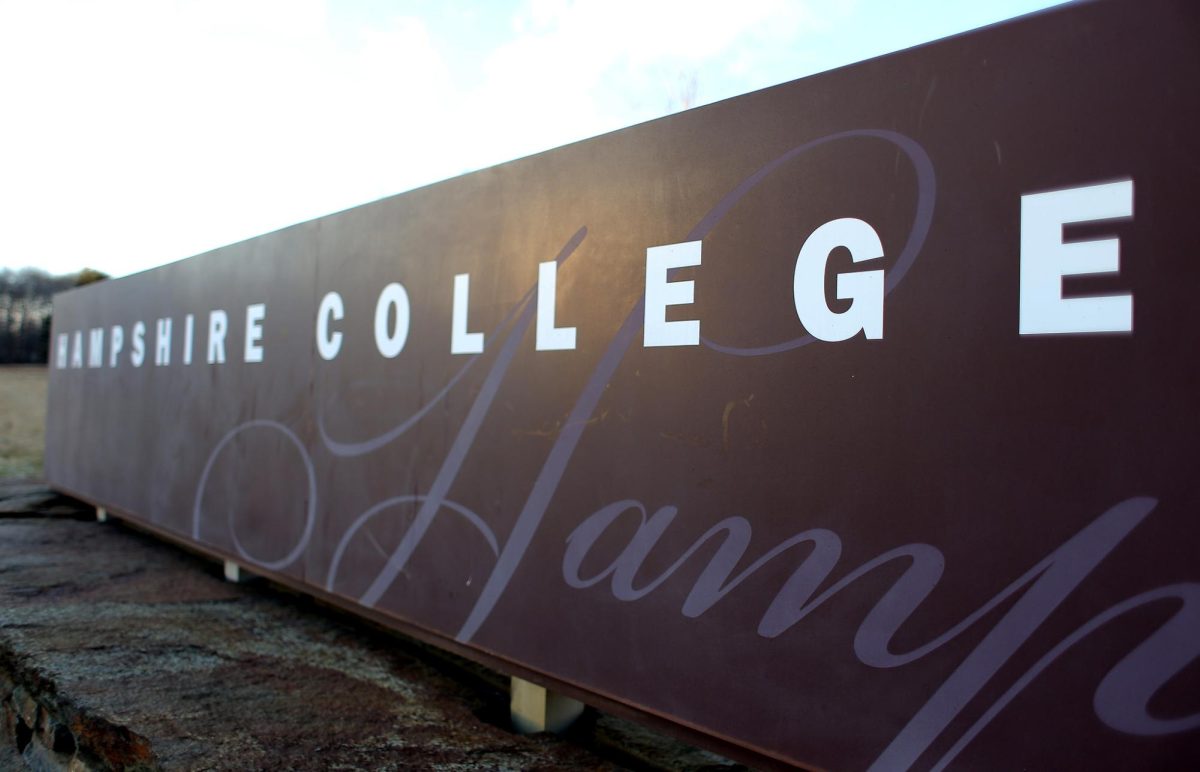At noon on Nov. 17, over a dozen people gathered at Amherst Commons near Amherst College to rally in favor of House Bill 2824, which would put a tax on certain private university endowments. Participants, primarily Amherst College students, heard speeches from community members and student leaders during the gathering.
The event was organized by the Public Higher Education Network of Massachusetts (PHENOM) and the Young Democratic Socialists of America (YDSA) groups in the Five College area.
The bill would put a tax of 2.5 percent on private endowments, at schools with endowment assets more than $1 million. All proceeds would be placed in a new fund called the Educational Opportunity for All Trust Fund, which would be used to subsidize “the cost of higher education, early education and child care for lower-income and middle-class residents of the Commonwealth.”
The federal government currently places a 1.4 percent tax on the investment income of private nonprofit educational institutions with more than 500 students and endowment assets over $500,000.
Colleges use endowment funds in a variety of ways, including financial aid and investing in new programs. Large endowment funds also provide financial stability for private institutions that are often dependent on donations to supplement a lack of public funding. Endowment funds are usually invested in stock or bond accounts to maintain growth.
As of the 2022 financial year, 14 Massachusetts private colleges and universities have endowments above $1 billion. Amherst College, Mount Holyoke College and Smith College, amongst others, would be taxed under the proposal.
Liam Rue, a University of Massachusetts junior political science major and PHENOM Communications Board member, emphasized that the bill isn’t trying to deplete private endowments. “It’s not like we’re trying to redistribute all their wealth, we’re merely asking that they pay their fair share,” he said.
Instead, Rue says that endowments should support broader goals of educational attainment. “Amherst College and other exclusive Massachusetts colleges, of which there are many, need their endowment,” he said. “They nurture brilliant, promising minds, but how many more gifted students could institutions like Amherst College educate if they actually used their vast fortunes to educate as many people as possible.”
Amherst College has a total endowment of $3.3 billion. The college’s endowment has the eighth largest endowment to student ratio, with over $1.4 million per student in the endowment.
Isabelle Anderson, a junior law, jurisprudence and social thought and American history major at Amherst College and head of the Amherst YDSA, said that the rally had been criticized by Amherst College’s Fizz community for going against the interests of Amherst College students.
To this, Anderson had a quick response. “Not everything is about us,” she said. Anderson compared the less than 2000 students at Amherst College to the “millions of Massachusetts residents from kindergarten to college, who could benefit from our enormous wealth in public schools that are currently underfunded and under-resourced.”
“Amherst College providing more for its students is not at odds with the endowment tax,” she said. “I encourage our campus population to push our institution to provide more for our needs, while also contributing to an important cause that is much greater than ourselves.”
PHENOM’s Executive Director Henry Morgan agreed with Anderson. “The vast majority of the… [funds in] endowments don’t actually go to helping the students. It sits there and it incurs compound interest over a long, long time,” he said.
William Prince, a junior history and architectural studies student at Amherst College, is from California. He used the public education system there as a “cautionary tale.”
“[California] used to have some of the best public schools in the world and in the United States. But now, we’ve fallen into the bottom 25th percentile [due to underfunded public schools],” he said. “I don’t want to see that happen to Massachusetts.”
“Eventually, I know students will come to their senses and realize that they can do something better for the public good and that they can be less greedy and less selfish,” Prince said.
Junior political science and government major at Amherst College Caden Stockwell said that the University has “a responsibility as an institution with billions and billions of dollars and massive amounts of wealth to use that money for the good of not just the students, but also for the community.”
“We should not be using our massive endowment to bomb children, we should be using it to teach them,” he said.
Melanie Huq, a junior physics and law, jurisprudence, and social thought major at Amherst College, was in attendance at the event; she had been involved in past efforts to advocate for environmental progress at Amherst College. “As long as our endowment is coming from sources that I consider to be highly questionable and as long as we’re in this state — often doing very little for the funding community — I think it’s only fair that we pay our fair share and give back to the state of Massachusetts,” she said.
Huq said actions by environmental groups on campus led Amherst College in 2021 to announce that they would stop investing in fossil fuels through their endowment and would divest from all currently held fossil fuel assets by 2030.
“I think that it’s especially important that we try to use the endowment in a way that promotes service and that promotes education for people and that serves the greater good.”
Huq said she would still support the tax even if the endowment was used in that way. “I think that it’s still important that we have, you know, a sustaining commitment to the state of Massachusetts… that is not just dependent on whether we feel like giving a donation,” Huq quoted, “but that [is] really a more underlying structure in place to ensure that Amherst College is continuously supporting the educational state.”
Daniel Frank can be reached at [email protected].




















